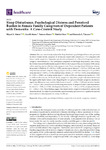Mostrar el registro sencillo del ítem
Sleep Disturbance, Psychological Distress and Perceived Burden in Female Family Caregivers of Dependent Patients with Dementia: A Case-Control Study
| dc.contributor.author | Simón, Miguel A. | |
| dc.contributor.author | Bueno, Ana M. | |
| dc.contributor.author | Blanco Seoane, Vanessa | |
| dc.contributor.author | Otero, Patricia | |
| dc.contributor.author | Vázquez, Fernando L. | |
| dc.date.accessioned | 2023-03-22T11:13:02Z | |
| dc.date.available | 2023-03-22T11:13:02Z | |
| dc.date.issued | 2022-12-02 | |
| dc.identifier.citation | Simón, M.A.; Bueno, A.M.; Blanco, V.; Otero, P.; Vázquez, F.L. Sleep Disturbance, Psychological Distress and Perceived Burden in Female Family Caregivers of Dependent Patients with Dementia: A Case-Control Study. Healthcare 2022, 10, 2435. https://doi.org/ 10.3390/healthcare10122435 | es_ES |
| dc.identifier.issn | 2227-9032 | |
| dc.identifier.uri | http://hdl.handle.net/2183/32737 | |
| dc.description.abstract | [Abstract] This case-control study analyzed the sleep disturbance, psychological distress and perceived burden in female family caregivers of dependent people with dementia (n = 74) compared with female family caregivers of dependent people without dementia (n = 74) and with age-matched non-caregiver control females (n = 74). Participants completed the Pittsburgh Sleep Quality Index (PSQI), the 12-item General Health Questionnaire (GHQ-12), the Caregiver Burden Inventory (CBI) and an ad hoc questionnaire to collect sociodemographic data. There were significant differences between the groups in PSQI total (F = 24.93; p < 0.001), psychological distress (F = 26.71; p < 0.001) and in all sleep domains assessed: subjective sleep quality (F = 16.19; p < 0.001), sleep latency (F = 9.5; p< 0.001), sleep duration (F = 18.57; p < 0.001), habitual sleep efficiency (F = 19.77; p < 0.001), sleep disturbances (F = 9.22; p < 0.001), use of sleep medications (F = 4.24; p< 0.01) and daytime dysfunction (F = 5.57; p < 0.01). In all measures, the female family caregivers of dependent people with dementia showed the significantly higher mean scores. Regarding the two groups of female caregivers, statistically significant differences were found in daily hours of care (t = −2.45; p < 0.05) and perceived burden (t = −3.65; p < 0.001), as well as in the following dimensions of caregiver burden: time-dependence burden (t = −5.09; p < 0.001), developmental burden (t = −2.42; p < 0.05) and physical burden (t = −2.89; p < 0.01). These findings suggest that female family caregivers of dependent patients with dementia should be subject to psychopathological screening and preventive cognitive-behavioral interventions in clinical practice in primary health care. | es_ES |
| dc.description.sponsorship | Universidade de Santiago de Compostela; 2022-CE081-10 | es_ES |
| dc.language.iso | eng | es_ES |
| dc.publisher | MDPI | es_ES |
| dc.relation.uri | https://doi.org/10.3390/healthcare10122435 | es_ES |
| dc.rights | Atribución 3.0 España | es_ES |
| dc.rights.uri | http://creativecommons.org/licenses/by/3.0/es/ | * |
| dc.subject | Sleep quality | es_ES |
| dc.subject | Psychological distress | es_ES |
| dc.subject | Caregiver burden | es_ES |
| dc.subject | Family caregivers | es_ES |
| dc.subject | Dementia | es_ES |
| dc.title | Sleep Disturbance, Psychological Distress and Perceived Burden in Female Family Caregivers of Dependent Patients with Dementia: A Case-Control Study | es_ES |
| dc.type | info:eu-repo/semantics/article | es_ES |
| dc.rights.access | info:eu-repo/semantics/openAccess | es_ES |
| UDC.journalTitle | Healthcare | es_ES |
| UDC.volume | 10 | es_ES |
| UDC.issue | 12 | es_ES |
Ficheros en el ítem
Este ítem aparece en la(s) siguiente(s) colección(ones)
-
UI- UIPSAL - Artigos [24]






